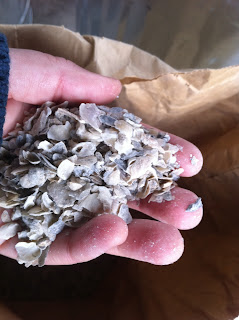We recently procured a couple of large metal bins for storing chicken feed. Why? Rodents, of course. Our garden shed was once the Hilton for a couple of very plump mice. They got into the food, the cracked corn (for treats), potting soil, garden seeds, fertililzer... You name it, they wrecked it. Solution? Metal bins, and a new concrete floor in the shed. The floor won't be done for another couple weeks, but the metal bins are a great way to put an end to the mousy frivoloties. Each of these bins has a thirty gallon capacity, which means they can each comfortable hold two fifty-pound bags of feed. The one in the foreground here has that amount in it, and you can see how much room is left. Bear in mind, this means that each bin will weight over one hundred pounds when full.
The lids fit snugly, and we have yet to experience any problems since using the bins. Price your local co-op and hardware store for the best deal. We got these for about $28 each at the big chain hardware store a mile from the house. They beat the local co-op by two bucks.
Buckets with tight-fitting lids also work well, but rats have been known to chew through plastic when desperate. Ours have held up well, but we're also careful to keep them in areas with lots of activity and foot traffic. Shifty little rodents prefer dark corners and quiet places to perform their acts of pilfering. The one pictured above is home to our supply of weed seeds.
Weed seeds? Really? Here in our little urban farm, we like to call ourselves frugal (aka cheap). Why pay for something when you can trade, barter, or get it for free? One of our neighbors works at the Snohomish County grain facility. Farmers bring in their grain, it gets ground, and the waste (weed seeds, hulls, bits of wheat, etc) falls to the floor. That neighbor expressed an interest in getting a herd of chickens to roam around and eat all that good stuff that was getting thrown away. Better solution - We'll take it! We mix this in a 1:2 ratio with their regular feed. The girls love it, it gives them extra protein and variety in their diet, it cuts down (a little) on feed cost, and it keeps perfectly good grain out of our county waste facilities.
We also add oyster shells to our ladies' meal plan. I've tried several ways of providing them with these shells, but the least messy method I've used is to incorporate it straight into the feeder. This gets mixed at a 1:4 ratio with the standard feed. So filling the feeder is easy. Four scoops of feed, two scoops of weed seeds, one scoop of oyster shells. Repeat.
A bag this size will last a long time. We've had this one for a year already, and it's still 3/4 full. And heavy!! Ground up oyster shells are also great in your garden. They repel slugs and other soft-bodied pests, and they provide a great source of calcium and magnesium for plants. We don't bother since there are loads of egg shells to fill that need in our raised beds.
Last, but possibly most important, access to fresh, green grass is really important to the dietary health of a chicken. Apart from fresh air, space to run and flap, crunchy insect snacks, and mite-busting dust baths, getting outside lets your chickens feel like chickens, not nuggets in a cage. If you can't let your hens out, or if the weather is just too nasty, make sure to give them plenty of treats to snack on. Cabbage leaves, melon rinds, and loads of other scraps from your garden and kitchen give them variety to nibble on, and they cut down on aggression during times of confinement. Chickens (like cows, sheep, and many other farm animals) also have the ability to digest grass and turn it into an edible product for humans to consume. This is our best way to get Omega 3 fatty acids. Check out this article from Eat Wild for more information on the benefits of consuming meat and eggs from grass-fed animals. The more they roam in the yard, the darker our hens' egg yolks get, and that's the whole reason we wanted to raise chickens in the first place.




























